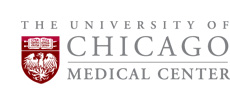Community
Medical Center Nurses Care for Haitian Earthquake Victims at the Frontline
In fiscal year 2010, the dedication of the University of Chicago Medical Center's nursing staff stretched far beyond the hospital's walls, with many nurses volunteering their time to treat Haitian earthquake victims.
With the first group of Medical Center employees departing for the field hospital in Fond Parisien, Haiti, on January 27, nurses worked in sub-standard conditions to tend to the needs of their Haitian patients. They dressed wounds inside sweltering, crowded tents, their scalps itching with heat, their scrubs damp with sweat. Often they had to search for patients who were displaced from their homes, finding them underneath tarps or at a church service. They worked past dark wearing miner lights strapped across their foreheads, cleaning wounds and redressing amputations.
"The first day we got there, we put our bags down and hit the deck running," said Tiffany Cupp, RN, BSN, a pediatric trauma emergency room nurse at Comer Children's Hospital and the first Medical Center employee to arrive in Haiti. "There were so many patients, 400 or 500 patients in the first day. I was up for 42 hours straight."
Cupp was the only pediatric trauma nurse at the Haiti Community Hospital and the clinic where she treated wounds, provided medication and administered IVs to children and adults. The hospital had water and electricity, but Cupp slept on the roof because the facility was overflowing with patients. She treated her patients not only at the field hospital about five miles from the earthquake's epicenter, but also in tent cities and orphanages. She and the medical team did what they could with limited medical resources, crafting IV poles made of tree limbs or taping IV bags to walls.
"When it came down to it, we got the job done," Cupp said.
Aside from selfless attention to their patients, Medical Center nurses brought unique capabilities to the earthquake-ravaged country. Instrumental to the efforts of the Medical Center team were the nurses of Haitian descent who were able to communicate with ground personnel and patients in French and Haitian Creole. One of those nurses was Nicole Muse, RN, ADN, MHA, a Neonatal Intensive Care Unit nurse who was part of the first Medical Center team deployment.
Richard Cook, MD, associate professor of anesthesia and critical care, credits Muse and Elvire LaPlanche, RN, a Haitian nurse from South Shore Hospital, as being the "backbone of the operation," noting their patience and hard work along with their ability to communicate with the Haitian people.
Medical Center nurses often went beyond their traditional expertise to help in any way they could. With so many countries donating much-needed medications and supplies, Karen Arndt, RN, BSN, CFRN, took charge of organizing the team's pharmacy. Arndt, who is the chief flight nurse at the Medical Center, arranged the mish-mash of boxes and updated the pharmacy shelves with new drugs.
"I'm not a pharmacist, but I played one in Haiti," Arndt said. "If you're going to work there, you need to be flexible."






















